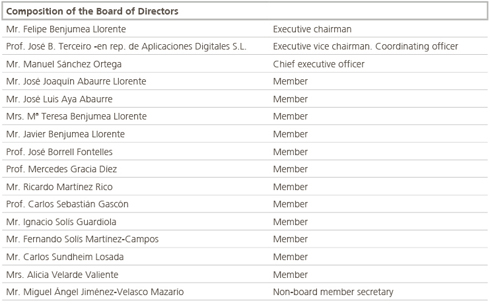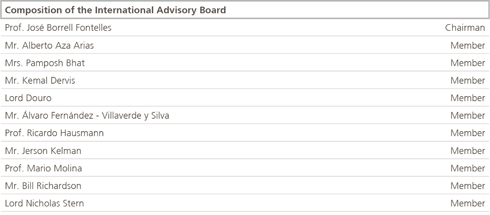 Abengoa
Abengoa
Annual Report 2011
Applying good governance practices that help to increase the transparency of the information published by the company generates value and improves third-party communications to thereby minimize risks and maximize benefits. For this reason, Abengoa addresses transparency and management needs in accordance with both national and international standards of business ethics.
Along these lines, in 2010 the International Advisory Board was, created in 2010, increased the number of women forming part of the company’s senior management, and Abengoa continues improving its efforts towards comprehensive prevention of corrupt practices.
In 2011, the appointment of Manuel Sánchez Ortega as the company’s chief executive officer was ratified, and the number of members of the International Advisory Board was increased. Apart from this, Abengoa remains the only company listed on the Spanish stock market to have its Annual Report on Corporate Governance undergo independent third-party verification, obtaining the highest level of assurance.

Board of Directors
The Board of Directors has its own internal rules and regulations which complement the provisions of Spain’s recent Capital Companies Act, subjecting the actions of directors to a set of rules on conduct, governed by the principles of business ethics and geared towards upholding the overriding priority of corporate interests and ensuring the transparency of Board resolutions.

The Board is composed of 15 members, 3 women and 12 men, whose ages range from 47 to 68. 7 of them are proprietary directors, 5 independent directors and 3 internal directors. None of them is a Board Member in any listed company.
In 2011, the Abengoa Board of Directors met on 11 occasions (one of which was held in writing, without a physical meeting having been called).
Following a favorable report from the corresponding committee, the Board is to approve at its plenary session the following company policies and strategies:
- Investment and financing policy.
- Definition of group structure.
- Corporate governance policy.
- Corporate social responsibility policy.
- Strategic or business plan, as well as management objectives and budget.
- Policy on remuneration and performance review of members of senior management.
- Policy on risk control and management, as well as periodic monitoring of internal reporting and control systems.
- Dividend policy, as well as policy on treasury stock and, in particular, restrictions thereon.
To ensure that control mechanisms are functioning properly and effectively, the Audit Committee and the Appointments and Remuneration Committee also have their own internal rules and regulations.
Audit Committee
This committee is primarily made up of non-executive members, thereby meeting the requirements established under standards of good governance. Likewise, in accordance with article 2 of the Internal Rules and Regulations, the office of committee chairman must fall upon a non-executive officer. These characteristics also apply to the Appointments and Remuneration Committee.
The duties and powers of the Audit Committee, as stipulated under the regulations, include overseeing and resolving conflicts of interest. Pursuant to the Regulations of the Board of Directors, directors are duty bound to inform the Board of any situations involving potential conflict in a preventive fashion and to abstain from taking any action until the committee has handed down a ruling.

Appointments and Remuneration Committee
Committee duties and powers include reporting to the Board of Directors on Board and Advisory Board appointments and remuneration, as well as the general compensation and incentive policy for members of these boards and for senior management; informing the Board of matters related to gender diversity; proposing the remuneration policy of directors and senior executives and individual remuneration of directors; and overseeing compliance with the remuneration policy established by the company.
The Appointments Committee acts as a watchdog to ensure that in filling any vacancies that may arise, selection procedures are not affected by implicit bias blocking the recruitment of female directors, and that shortlists include female candidates whose professional profiles meet the profile sought. The committee is the body in charge in all such cases and draws up and passes its proposal, stating grounds, to the Board of Directors, applying the criteria of independence and professionalism established under the Regulations of the Board of Directors and under the Committee’s own rules and regulations.
The performance of the Board and of executive officers is assessed at the proposal of the Appointments Committee by means of substantiated reporting to the Board at its meeting held during the first subsequent quarter, once the previous fiscal year has ended and the accounting results for the year or at least an estimation thereof have been obtained as well as the audit report, all of which are indispensable elements of the assessment process.

Strategy and international vision
Abengoa voluntarily supplements its efforts by creating support bodies to ensure full awareness of the needs of the company’s principal stakeholders and optimal business development. These bodies are: the Strategy Committee and the International Advisory Board.
Strategy Committee
This committee comprises the executive chairman, the executive vice chairman, the chief executive officer, the director of Corporate Strategy and Development, the Business Group directors, the chief technical officer, the director of Human Resources, the director of Organization, Quality and Budgets, the financial director, the director of Planning and Control, the director of International Institutional Relations, the general secretary for Sustainability, and the general secretary.
This committee meets monthly and is governed by the Internal Code of Conduct in Stock Markets, which sets down a series of obligations to protect information and uphold the duty of secrecy, while addressing preliminary decision-making and disclosure aspects of relevant corporate actions, establishing for such purpose the pertinent procedures for ensuring internal and external confidentiality, recording ownership of shares, and dealing with transactions involving securities, and conflicts of interest.
International Advisory Board
Conscious of the international implications of its business concerns, in 2010 Abengoa created the International Advisory Board, whose election is incumbent on the Board of Directors.
Although the board was initially made up of seven members, the decision was reached in 2011 to increase the number of members to eleven, all of whom have a clearly international background.
The Advidsory Board is set up as a non-regulated voluntary body for purposes of providing consultation and technical advice to the Board of Directors, to which it remains accountable as a consultation and professional advisory body. Its main duty is that of supporting the Board of Directors by providing collaboration and consultation, gearing its activity towards addressing queries raised by the Board of Directors or presenting any proposals deemed pertinent.

© 2011 Abengoa. All rights reserved
